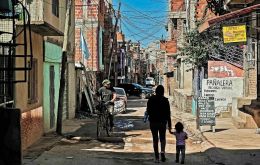MercoPress. South Atlantic News Agency
Tag: Indec index
-
Sunday, April 16th 2023 - 23:28 UTC
Argentine Cabinet Chief admits war against inflation is being lost

Argentina's Cabinet Chief Agustín Rossi admitted the administration of President Alberto Fernández was losing the battle with inflation. “We thought we were getting there, but we weren't,” Rossi was quoted as saying by local media. “Nobody can be happy, least of all us”, he added.
-
Friday, March 31st 2023 - 09:31 UTC
Argentina's poverty indexes on the rise

Argentina's National Institute of Statistics and Census (Indec) Thursday released a study showing that 39.2% of the South American country's economically active population was living in poverty in the second half of 2022, an increase from the 37.3% recorded during the same period of 2021
-
Friday, March 17th 2023 - 08:48 UTC
BCRA adjusts benchmark interest rate: 78% annually

Argentina's Central Bank (BCRA) Thursday decided to raise the benchmark interest rate by 300 basis points to 78% annually, it was announced in Buenos Aires the day after the INDEC said the Consumer Price Index for the month of February ad grew 6.6% for a year-on-year inflation of 102.5 %, the highest in the last 32 years.
-
Wednesday, February 15th 2023 - 09:38 UTC
Inflation in Argentina reaches 6% in January

Inflation in Argentina reached 6% in January of 2023, according to a report from the National Institute of Statistics and Census (Indec) released Tuesday, which also showed the interannual consumer price index went up 98.8%. It was the highest monthly rate since 1991 when it reached 84%.
-
Friday, December 16th 2022 - 08:36 UTC
Argentina's inflation for November set at 4.9%

Argentina's Consumer Price Index (CPI) rose 4.9% in November for an accumulated 85.3% in the first eleven months of the year, according to a report released Thursday by the National Institute of Statistics and Census (Indec).
-
Thursday, December 8th 2022 - 09:11 UTC
Argentine fisheries exports drop in volume and income in ten months of 2022

Argentine fisheries exports during the first ten months of the year reached 408.233 tons and US$ 1,568bn with a drop both on average in volume and income of 9,5% compared to the same period a year ago, according to the stats made public by CAPECA, the Argentine //fishing vessel owners organization.
-
Tuesday, November 22nd 2022 - 08:37 UTC
Fourth Kirchner government climax, 12 month food inflation at 100%

The basic food basket, CBA, in Ushuaia, Tierra del Fuego province, Argentina soared 9,5% during October while the overall food basket, CBT, 9%, according to the latest figures from Indec, the country's stats office. This is 50% higher than the inflation rate for the month of October which stood at 6,3%.
-
Wednesday, June 22nd 2022 - 10:44 UTC
More poverty and misery ahead for most Argentines as food prices soar

An Argentine household needs a monthly income of at least 100,000 Pesos equivalent to US$ 781 at the official rate, (128 Pesos to the dollar) or US$ 454 (free market, 220 Pesos to the dollar) to remain just above the poverty line, according to the latest estimate from the government's Stats Office, Indec.
-
Monday, October 4th 2021 - 20:03 UTC
Argentina's statistics bureau finds 4 out of 10 people are poor

The latest data from Argentina's National Institute of Statistics and Censuses (Indec) show that the poverty index has reversed a meager 1.4 % during the first half of 2021.
-
Friday, August 13th 2021 - 09:37 UTC
Argentina's inflation for July 2021 measured at 3%

Argentina's Consumer Price Index (CPI-Cost of Living) increased 3% in July, according to a report from the National Institute of Statistics and Censuses (Indec) released Thursday.
